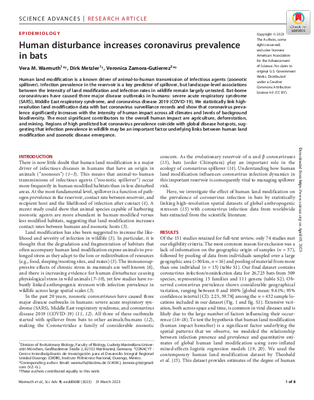Human Disturbance Increases Coronavirus Prevalence in Bats
Human land modification is a known driver of animal-to-human transmission of infectious agents (zoonotic spillover). Infection prevalence in the reservoir is a key predictor of spillover, but landscape-level associations between the intensity of land modification and infection rates in wildlife remain largely untested. This research links land modification data with bat coronavirus surveillance records and show that coronavirus prevalence significantly increases with the intensity of human impact across all climates and levels of background biodiversity.
https://biodiversitylinks.org/learning-evidence/one-health-evidence/one-health-evidence-inbox/human-disturbance-increases-coronavirus-prevalence-in-bats.pdf/view
https://biodiversitylinks.org/learning-evidence/one-health-evidence/one-health-evidence-inbox/human-disturbance-increases-coronavirus-prevalence-in-bats.pdf/@@download/image/image.png
File
Human Disturbance Increases Coronavirus Prevalence in Bats
Author(s):
Vera M. Warmuth, Dirk Metzler, Veronica Zamora-Gutierrez
Publication Date: 2023
DOWNLOAD FILE
Human land modification is a known driver of animal-to-human transmission of infectious agents (zoonotic spillover). Infection prevalence in the reservoir is a key predictor of spillover, but landscape-level associations between the intensity of land modification and infection rates in wildlife remain largely untested. This research links land modification data with bat coronavirus surveillance records and show that coronavirus prevalence significantly increases with the intensity of human impact across all climates and levels of background biodiversity.



